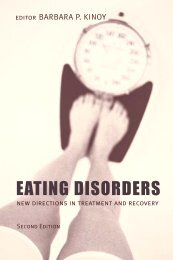GEORGE A. GONZALEZ - fieldi
GEORGE A. GONZALEZ - fieldi
GEORGE A. GONZALEZ - fieldi
Create successful ePaper yourself
Turn your PDF publications into a flip-book with our unique Google optimized e-Paper software.
2THE POLITICS OF AIR POLLUTIONDavid Ricardo (1830) describes the political economy of capitalism ascomprising an effort between land owners, workers, and capitalists to capturethe economic benefits derived from modern production techniques (also seeFoley 2003). The historic conflict over air pollution in the United States islargely the result of landed interests seeking to maximize the value of theirland by minimizing the economic harm from airborne pollution. Therefore,as industrial capitalists, in the process of producing and selling commoditiesto capture profit, emit air pollution, landed elites seek to abate localized airpollution to capture rent from the utilization of their land. Segments of theworking class have only been recently mobilized on the issue of air pollution,but this recent mobilization has not significantly altered the terms of the airpollution debate set by large land owners and industrial capitalists. Thisdebate is centered around the deployment of technology to abate localized airpollution (i.e., the “ecological modernization” of production and transportationfacilitates).To analyze the politics of air pollution in the United States, I havededuced from the above theoretical framework a thesis with four interrelatedcomponents. Each component of this thesis is original and controversial inits own way:1. The first component of this thesis is that U.S. air pollution abatementpolicies are driven by landed interests. These interests take the contemporaryform of local growth coalitions—composed mostly of large land holders, landdevelopers, and the owners of regional media and utility firms. Local growthcoalitions economically profit from economic growth in particular localities(Logan and Molotch 1987).My position on the political impetus underlying U.S. clean air policiesis not shared by other scholars who analyze clean air politics. They generallyhold that U.S. air pollution abatement policies flow from middle-class concernsover the negative aesthetic and health effects of air pollution. In otherwords, the politics over air pollution is set by most contemporary thinkerswithin a framework pitting relatively privileged segments of labor (i.e., themiddle class) against capital (e.g., Inglehart 1977; Hays 1987; 2000;Stradling 1999).2. The second part of my thesis is that clean air policies are functionalto the operation of the market and to the realization of profit. Political scientistsand historians who study U.S. pollution abatement policies havefailed to realize this, with some exception (e.g., Dewey 2000), because theyexclusively focus on the economic costs absorbed by industrial manufacturersas a result of clean air policies. They fail, however, to consider the economicbenefits derived from cleaner air by real estate interests and otherprofit-driven concerns whose markets are place bound (e.g., regional mediaoutlets and utilities). To the extent that clean air policies reduce air pollu-









